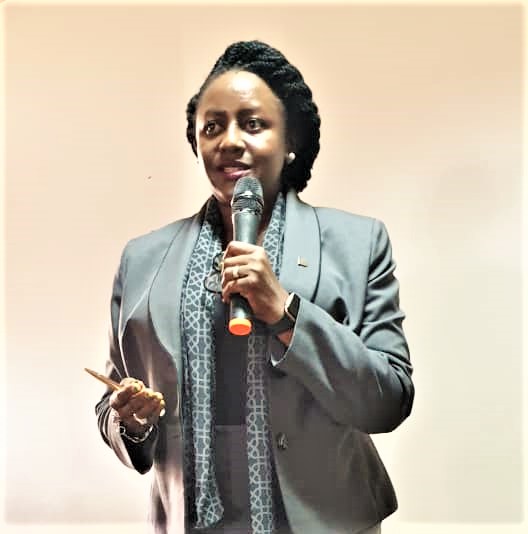JINJA – Geraldine Ssali, the Permanent Secretary to the Ministry of Trade, Industry, and Cooperatives, has urged all stakeholders involved in the implementation of the Parish Development Model (PDM) to embark on changing the mindset of the general public if the model is to succeed.
Ssali was speaking at the Annual General Meeting (AGM) of the Association of District Commercial Officers and Cooperative Officers held at Jinja Civil Service College. The meeting brought together District Commercial Officers from across Uganda, Cooperative officers from the department of cooperatives, Cyprian Chillanyang-the Commissioner for Finance & Planning at Ministry of Local Government together with the team from the Parish Development Model Secretariat and the team from the Uhuru Institute for Social Development who were in attendance as key stakeholders in the development and one of the sponsors of the event.
“I dare you; this won’t go far if you do not work on the people’s mindset. Work on the mindset first, or they will all receive the money and eat it. Because they know the government gives free money,” she said.
She assured the Commercial officers of 100% support noting that they are the foot soldiers for the implementation of all Trade Industry Local Economic Development functions at the Local Government. The commercial officers work under the Trade, Industry, and Local Economic Development Department.
TILED is a department of the Ministry of Local Government responsible for the delivery of trade development and promotion, enterprise development, market linkages, cooperative mobilization and trade outreach, tourism promotion, and industrial development services.
The department implements the LED Policy which provides a framework for partnerships in local economic development to ensure inclusive, sustainable, and equitable economic growth at local levels.
Ssali further implored the District Commercial Officers to develop strategies that would enable the service of the PDM to reach the lowest person in every parish.
The Parish Development Model is anchored on seven key pillars namely; production, storage, processing, and marketing, as pillar number one. The second pillar is infrastructure and economic services, while the third pillar is on financial inclusion, which is deemed key for monitoring and evaluation. Social Services is the fourth pillar while mindset change which includes cross-cutting issues like gender, disability, and environment is pillar number five. Information management systems based at the parish level as well as governance and administration are the sixth and seventh pillars respectively.
Following an address by Ciprian Chillanyang on the implementation of the PDM, she expressed skepticism on whether the Uganda Shillings 100 million would produce the much-needed development at the local government level, urging the PDM stakeholders to produce evidence-based research that indicates that how much money each parish in the country would need to change their fortunes.
“Some parts of the country are more advanced and bigger in size compared to other parishes which are much smaller in population that Ugx 100 million may not be enough,” she claimed.
Ssali also encouraged Commercial Officers to provide information and feedback to the team at the helm of the Parish Development Model in ensuring that the needs of the communities are adequately addressed.
“You’re at the bottom of the implementation stage, please advise these people from the center on the right paths to follow while getting to the action,” she added.
Ssali adds that with the right strategies, the project would be a success, urging the implementers to prioritize inclusiveness and gender parity.
On the financial inclusion pillar, she wondered why the loanable funds will be charged a minimal interest rate which would be based on the inflation rate at the time, plus 1%.
“Ugx 100m per parish, is a hard knock, and then you charge an interest! At a moral level and financial sense, it’s not right.”
She added that the government ought not to operate like a commercial bank, but rather a state that should provide the funds as a service to uplift communities from poverty.
“We need to be realistic, we’re not a bank, we need to think and re-strategize realistically,” she said.
On their part, the Commercial Officers reported that they are faced with multiple operational challenges at their stations which would call for her intervention. The challenges noted include; lack of transport facilities and other office equipment yet at least 80% of the work they do is field-based.
The Chairperson of Commercial Officers Association Kigozi James, further noted that several government projects are implemented without clearly established guidelines and communication, which bogs their operations down.
“Like Emyooga, we all got stuck, we did not have clear guidelines, yet everyone wanted the money. Those that were sent did not have authentic signatures,” he said.
He called for a clear and streamlined communication line between the center and their local governments.
In addition, several participants emphasized the need for timely, orderly, and well-coordinated communication from the government regarding the implementation of the Parish Development Model.
Charles Aboola, one of the Technical advisors in the department of LED Under MoLG, informed the stakeholders that the PDM is not new because the government has already been working at the parish level and clarified that the government is expanding its interventions at the parish level to deal with the silo mentality that has undermined government efforts in achieving more amidst the constrained resource envelope.
He also urged the DCOs to work with the guidelines that have been provided even though they are not signed, but cautioned them to always ensure written confirmation from the secretariat. He further elucidated that the current guidelines are not signed because they may change since the PDM implementation continues to undergo several adjustments.
Buy your copy of theCooperator magazine from one of our countrywide vending points or an e-copy on emag.thecooperator.news
